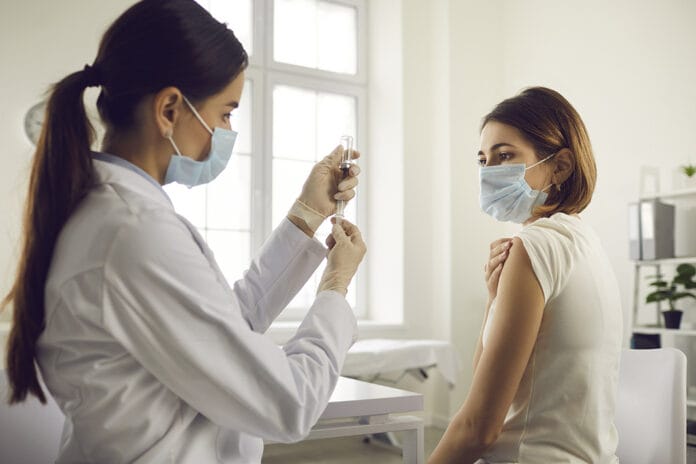After 10 long months of experiencing some of the darkest hours in world history, the calvary finally arrived – in the form of a vaccine. The pandemic brought grief to many who lost loved ones and others who suffered economic challenges. These emotions may still be a top concern to some reading this article, and my heart is with you. Political unrest has also caused emotional challenges, including debates over how state governors handled closures, mask mandates, limiting family gatherings, and travel.
The latest polarizing topic is whether a vaccine mandate will be required for dental staff members. Some want the freedom of choice to make their own decision regarding receiving a vaccine, while others want their employers to provide a safe work environment by requiring everyone to get a vaccine. It has been a difficult year, and vaccine discussions will fuel additional disputes.
The newest debate, which will likely play out in the courts during the months to come, will try to answer the question: “Should employers be allowed to mandate vaccines for employees?” A recent Gallup poll reported that 58% of Americans are willing to get a COVID-19 vaccine.1 This is up from a poll in October that reflected just 50% of Americans were willing to get vaccinated.
A willingness to get a vaccine is certainly different from receiving a mandated vaccine. One implies free choice while the other removes choice, at least to a certain degree.
Vaccines for measles, mumps, and rubella (MMR) and hepatitis B have long been a requirement to get into dental school or dental hygiene school. The flu vaccine is often encouraged but not required for admission. The prospective student always retained the choice. However, a lack of admittance to the dental education program was a common result if the choice was to decline the appropriate vaccines. Respected sources such as the Equal Employment Opportunity Commission (EEOC), the American Dental Association (ADA), the Occupational Safety and Health Administration (OSHA,) and the Society of Human Resource Management (SHRM) are now chiming in on the issue of employer-mandated vaccines by publishing their positions on this debate. So far, the answer is a solid maybe.
A Violation of Civil Rights?
The U.S. Equal Employment Opportunity Commission (EEOC) enforces anti-discrimination laws in the workplace. Well-known laws enforced under the EEOC include the Americans with Disabilities Act (ADA) and the Rehabilitation Act, which require reasonable accommodation to employees with disabilities. They also enforce Title VII of the Civil Rights Act, which prohibits discrimination based on race, color, national origin, religion, and sex, including pregnancy.
The EEOC makes it clear an employer can take your temperature, force you to stay home if you have any symptoms of the virus, and require a negative COVID-19 test or doctor clearance for your return to work. Nevertheless, can they force the administration of a vaccine in order to maintain your employment?
On December 16, the EEOC released the following statement, “The EEO laws, including the ADA and Rehabilitation Act, continue to apply during the time of the COVID-19 pandemic, but they do not interfere with or prevent employers from following the guidelines and suggestions made by the CDC or state/local public health authorities about steps employers should take regarding COVID-19. Employers should remember that guidance from public health authorities is likely to change as the COVID-19 pandemic evolves. Therefore, employers should continue to follow the most current information on maintaining workplace safety.”2
As part of this statement, the EEOC released a series of questions and answers that are specific to employee rights as they relate to a mandated COVID-19 vaccine in the workplace. The EEOC controls the questions an employer may ask to screen employees for any medical limitations to receiving the vaccine in order to protect the employee’s right to medical privacy.
The federal agency acknowledges that the screening questions to receive a vaccine have not been formally written yet. Suppose the screening questions ask about disabilities or genetic information. In that case, the employer should request the vaccine is administered by a third party rather than within the dental practice to protect the employee’s right to privacy.2
They also define exceptions for mandated vaccines, notably due to medical conditions, disability, or a sincerely held religious belief. The Pfizer-BioNTech and Moderna vaccines, for example, are currently contraindicated for those who have had a severe allergic reaction to the first dose of the vaccine.
The EEOC also states that it would be lawful for an employer to exclude the employee from the workplace if they refused the vaccine due to a disability or sincerely held religious belief. In other words, although exceptions have been identified by the EEOC, they do not preclude employers from excluding those that ask for exceptions from the workplace. In some cases, employers may ask an employee to work from home. When working from home is not possible (as is the case for dental hygienists), an employer-mandated vaccine may overrule the employee’s right to ask for an exception. This will likely play out in the court system in the months to follow.
American Dental Association’s Position
On October 6, the ADA released the following statement: “When a vaccine for COVID-19 becomes available, the choice to be vaccinated for the SARS-CoV-2 virus remains a personal decision.”3
In the same article, the association said, “Since dentists and hygienists are included in the framework for receiving the initial supply of approved, available vaccines, each dental professional will need to decide whether or not to receive the vaccine.”3
At the time of the October 6 article, the legality of mandated vaccines was not a trending topic. An additional resource, “COVID-19 Vaccination: Key Facts,” for the dental community was subsequently provided on December 14 but again did not address legal issues related to employers mandating a COVID-19 vaccine as a requirement for continue employment.
As of the writing of this article, it appears the ADA is not supporting mandated vaccines, but stay tuned as that may change in the future.
Occupational Safety and Health Administration’s Position
OSHA has also published a position on the legality of mandated vaccines. On November 19, OSHA published a report in the OSHA Defense Report.
“As a threshold matter, it should be noted that according to a member of the federal advisory panel on immunizations that will be making recommendations to the CDC on who should get the first doses, vaccines authorized under the FDA’s emergency use authority, as these COVID-19 vaccinations will be at the start, cannot be mandated. Any COVID-19 vaccine brought to market under an Emergency Use Authorization (EUA) instead of the normal non-emergency approval process will, by necessity lack long-term safety data. In general, though, outside the context of EUA vaccine, employers can require vaccination as a term and condition of employment, but such practice is not without limitations, nor is it always recommended.”4
The article goes on to note that mandatory vaccinations should be limited to job-related necessity and abide by all EEOC laws. There are clear job-related indications for vaccinations inside dental practices during aerosol-generating procedures. Another strong maybe.
Society of Human Resource Management Position
SHRM has published a number of articles on this topic. On December 8, SHRM stated, “As COVID-19 vaccines become available, many employers will have a strong case for requiring employee vaccinations, so long as their vaccination policies have certain exceptions, are job-related, and are consistent with business necessity, legal experts say.” This is particularly true in workplaces that carry a higher risk of infection due to the inability to maintain social distancing. Health care, travel, retail, or other businesses whose employees are at risk or who present a risk to others will have more business reasons to be “pro-vaccine,” said Jon Zimring, an attorney with Greenberg Traurig in Chicago.5
Robin Samuel, an attorney with Baker McKenzie in Los Angeles, added, “Employers may require vaccines before employees return to the worksite if the failure to be vaccinated constitutes a direct threat to other employees in the workplace. Exceptions must be made for employees who cannot be vaccinated because of disabilities or due to sincerely held religious beliefs.”
In the same article, Diane Welch, an attorney with McDonald Carano in Las Vegas, stated, “For some employers, implementing a mandatory vaccination policy makes sense, particularly for employees in positions that provide direct health care, caretaking of children and the elderly, or serving other populations at elevated risk from COVID-19. However, there are several important exceptions to a mandatory vaccine policy, making a policy that encourages—but does not require—vaccination easier to administer for many employers.”5
Employers will need to weigh their decision carefully about whether to mandate or simply encourage employees to get a vaccine.
Summary
COVID-19 poses a direct threat to employees in high-risk positions. Aerosols created during dental procedures place dental team members in this type of high-risk environment. The argument can be made that the dental profession has successfully reduced its risk through infection control protocols.
According to the Health Policy Institute (HPI), the transmission rate within dental practices is less than 0.1%.6 This low rate of transmission has not necessarily reduced the dental staff member’s fear of contracting the virus.
It is clear that vaccination requirements will likely come from individual employers after assessing the risk level for their employees rather than federal or local governmental agencies. Exceptions based on civil rights protections will remain a part of this regulated landscape. In the coming months, courts are expected to hear and rule on the legality of mandated vaccinations.
For now, the answer to “Can my employer legally mandate that I receive a COVID-19 vaccine?” remains a strong, “MAYBE.” Stay tuned and stay healthy.
Need CE? Check Out the Self-Study CE Courses from Today’s RDH!
Listen to the Today’s RDH Dental Hygiene Podcast Below:
References
- Reinhart, R.J. (2020, November 17). More American’s Now Willing to Get COVID-19 Vaccine. Gallup. Retrieved from https://news.gallup.com/poll/325208/americans-willing-covid-vaccine.aspx
- What You Should Know About COVID-19 and the ADA, the Rehabilitation Act, and Other EEO Laws. (2020, December 16). S. Equal Employment Opportunity Commission. Retrieved from https://www.eeoc.gov/wysk/what-you-should-know-about-covid-19-and-ada-rehabilitation-act-and-other-eeo-laws
- COVID-19 Vaccination: Key Facts. (2020, December 16). American Dental Association. Retrieved from https://success.ada.org/~/media/CPS/Files/COVID/ADA_Vaccine_Insight_Key_Facts.pdf?la=en
- Conn Maciel Carey’s Task Force. (2020, November 19). What Employers Need to Know about Mandatory COVID-19 Vaccines. The OSHA Defense Report. Retrieved from https://oshadefensereport.com/2020/11/19/what-employers-need-to-know-about-mandatory-covid-19-vaccines/
- Smith, A. (2020, December 8). When Employers Require Covid-19 Vaccinations. Retrieved from https://www.shrm.org/resourcesandtools/legal-and-compliance/employment-law/pages/coronavirus-mandatory-vaccinations.aspx
- Versaci, M. (2020, October 15). ADA Study Finds COVID-19 Rate Among Dentists Less Than 1%, American Dental Association: ADA News. Retrieved from https://www.ada.org/en/publications/ada-news/2020-archive/october/ada-study-finds-covid-19-rate-among-dentists-less-than-1-percent












